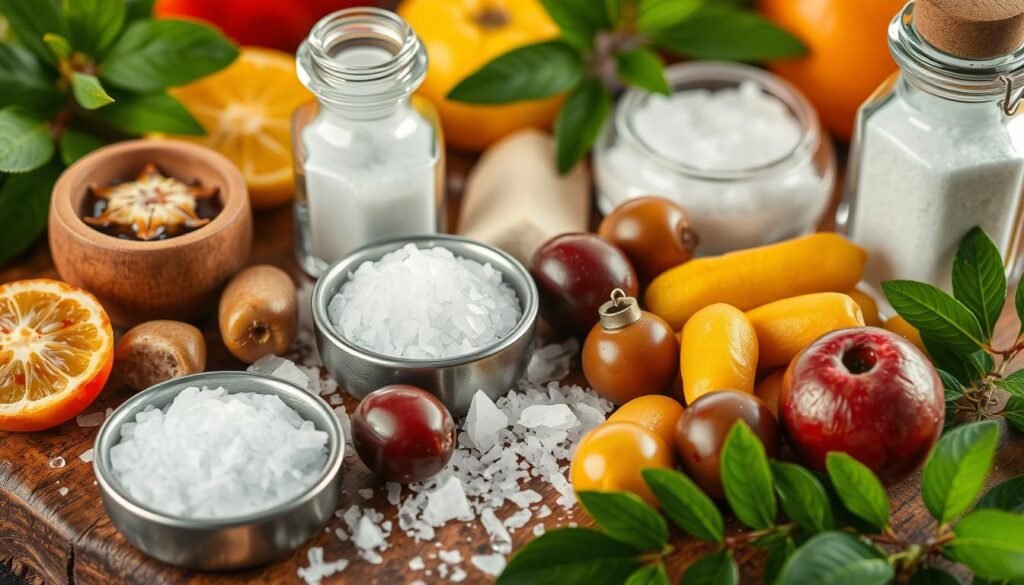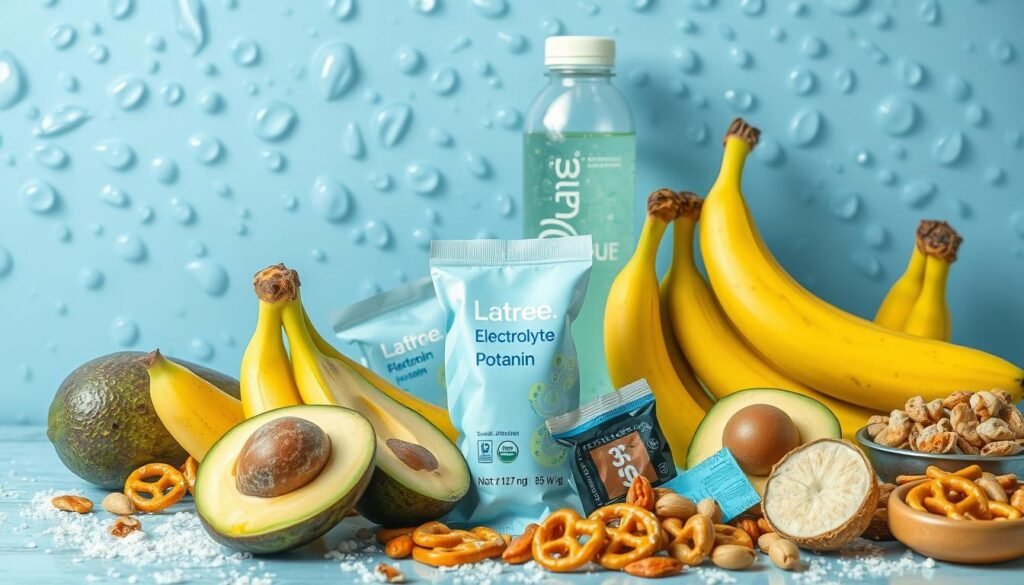Did you know that inside our bodies, intracellular fluids (ICF) make up about 60% of all body fluids? They account for 40% of a person’s total body weight. This shows how crucial electrolytes, especially sodium and potassium, are in keeping us hydrated. This is especially true during intense fitness bulking phases. As we amp up workouts and drink more fluids, we must understand how electrolytes balance helps.
Sodium and potassium don’t just support muscle health. They also keep muscle cramps and dehydration at bay. With proper electrolyte balance, performance, and recovery improve significantly.
Let’s dive into how these important electrolytes affect hydration and muscle function. This knowledge can really influence our fitness efforts.
Key Takeaways
- Electrolyte balance is crucial for hydration and muscle performance during a bulk.
- Sodium and potassium help regulate fluid distribution and cells’ functions.
- Understanding electrolyte roles can prevent dehydration and cramps.
- Maintaining adequate levels of these electrolytes supports optimal muscle health.
- Proper hydration is essential during intense training periods for effective recovery.
Understanding Electrolyte Balance
Electrolytes are key for fluid balance, nerve tasks, and muscle moves. These important minerals come in two types: inside and outside cells. Inside, we find mostly potassium. Outside, it’s mainly sodium. Keeping these electrolytes balanced is vital. Without balance, you might face dehydration or weak muscles.
Eating right, drinking enough, and exercise affect the balance of electrolytes. For example, older people need different amounts of sodium and potassium. Those who do intense workouts and sweat a lot should watch their hydration. A single litre of sweat can have a lot of sodium, depending on several things like body size and the weather.
If you exercise a lot or are trying to gain muscle, knowing how to handle fluid and electrolytes is key. During long fitness activities, sports drinks with electrolytes can really help. They make sure your body holds onto water better. It’s especially important to get enough sodium if you sweat a lot.
The Importance of Sodium in Hydration
Sodium is a key electrolyte needed for keeping our bodies properly hydrated. It helps balance fluids by making sure water moves into and out of cells right. The kidneys work hard to manage sodium levels, especially after we sweat a lot.
For athletes, getting enough sodium is super important during heavy workouts. They lose a lot of sweat, which has loads of sodium. To stop dehydration and symptoms like tiredness and headaches, it’s crucial to get this sodium back. Drinking a sports drink with at least 250 mg of sodium per 20 ounces is wise for exercises lasting more than an hour. Those who sweat a lot or do long workouts might need even more sodium.
Sodium not only keeps you hydrated but also boosts muscle performance. Muscles need it to work well. Without enough sodium, our muscles and nerves might not function as they should. Athletes should aim to replace 250 to 500 mg of electrolytes per hour to stay in top shape.
Finding the right supplements can be a game changer for long fitness sessions. Items like energy gels and electrolyte tablets can add more sodium and chloride. To figure out exactly how much sodium you need, talking to a sports nutrition expert is a good move. This could be especially helpful for those pushing themselves in endurance sports.
Check out this awesome guide for tips on staying hydrated the right way.

Role of Potassium in Muscle Performance
Potassium is key to how muscles work and contract. It’s found inside cells, helping to control muscle actions. It keeps cramps at bay during long workouts, which is vital for athletes.
Not getting enough potassium can cause problems like muscle weakness and heart issues. When you exercise hard or in hot weather, you lose more potassium through sweat. People can sweat out a lot of potassium, especially with intense training. This loss can become serious over several days of hard exercise.
Athletes trying to bulk up may find potassium supplementation helpful. They should eat foods high in potassium, such as bananas and oranges. These are easy to find and can keep potassium levels up. Getting about 4,700 mg of potassium each day is good for muscles and electrolyte balance.
Overlooking the role of potassium can result in nausea and slow reactions. Runners doing long distances might lose a lot of potassium. This can cause cramps and tiredness, affecting their performance. Eating plenty of fruits and vegetables can help.
It’s important for athletes to keep their potassium levels right, especially in tough training. Knowing about potassium and muscle performance is key. For more tips on keeping muscles healthy and avoiding cramps, check out this resource.
Electrolyte Balance during bulk
For athletes bulking up, keeping track of electrolyte balance is key. This is crucial for those doing intense resistance training. As they eat more to bulk up, their bodies need more fluids and electrolytes. During workouts, sweating makes them lose sodium and potassium, which are important for muscles and health.
It’s important to include electrolytes in hydration plans. Sports drinks with added electrolytes help replace what’s lost through sweat. Products like HOSSTILITY, INTRA[R3], and SILO[9] have essential electrolytes like sodium, magnesium, and potassium. They help keep you hydrated and aid muscle recovery. Did you know that we lose about one gram of sodium for every liter of sweat? That shows why getting enough electrolytes is key for performing your best.
When planning hydration, pay attention to your body’s needs. Change your electrolyte intake based on how hard and long you exercise. For long workouts, those over 60-90 minutes, drinks with both carbs and electrolytes are best. They keep your energy and hydration up.
The table below shows how much of each electrolyte athletes need every day:
| Electrolyte | Recommended Intake |
|---|---|
| Sodium | 1500 mg (1300 mg for those over 50, 1200 mg for those over 70) |
| Potassium | 4700 mg |
| Magnesium | 320 mg for women, 420 mg for men |
| Calcium | 1000 mg (1200 mg for those over 50) |
| Chloride | 2300 mg (2000 mg for those over 50, 1800 mg for those over 70) |
Getting the right balance of electrolytes helps athletes in bulking phases. It keeps their performance high, prevents muscle cramps, and supports their health. This is key for their training success.

How Sodium and Potassium Impact Hydration Levels
Sodium and potassium play big roles in how well our bodies stay hydrated. Sodium-potassium relationship is key for keeping fluids balanced, so our cells don’t dry out or swell too much. Sodium attracts water outside cells, while potassium does that inside cells. This balance helps muscles work right and keeps us performing well.
When you work out hard, you lose sodium and potassium through sweat. Sweat usually has 1 to 2 grams of sodium in each liter. Athletes losing more than 2% of their body water risk dehydration. This can cause muscle cramps or tiredness. To avoid this, it’s good to eat about 4–6 grams of sodium and 3.5–5 grams of potassium every day.
If sodium and potassium levels get off track, it can mess up how hydrated you are. Eating foods rich in potassium like bananas and spinach helps. So does drinking sports drinks with lots of electrolytes. Drinking 1 cup of water every 20 minutes during sports might stop hyponatremia. That’s when you drink too much water and not enough sodium.
Keeping up with sodium and potassium is super important, especially if you’re trying to bulk up or training hard. Eating right and drinking properly can boost your game and your recovery time. For tips on how athletes can use sodium better, look at this Why Do Athletes Use Salt page.

The Relationship Between Electrolytes and Cramp Prevention
Keeping a good electrolyte balance is key in cramp prevention. Not having enough essential minerals like sodium and potassium can lead to muscle cramps. These cramps are common in athletes and those doing a lot of physical work. This is especially true in hot environments where you lose more electrolytes in your sweat.
Studies show that 74% of muscle cramps happen to athletes. This shows how crucial it is to drink fluids that contain electrolytes. Athletes and others who work out a lot need to make sure they get enough sodium and potassium before, during, and after exercise.
Also, different people have distinct challenges with muscle cramps. About 37% of Americans over 60 deal with cramps at night. And half of pregnant women face these painful cramps, especially in the later stages of pregnancy. This shows the need for good cramp prevention methods for older adults and those facing special health situations.
| Population Group | Percentage Experiencing Muscle Cramps |
|---|---|
| Americans 60+ | 37% |
| Pregnant Women (General) | 50% |
| Athletes | 74% |
| COPD Patients | 46% |
| Children with Charcot-Marie-Tooth Disease | 32% |
To prevent cramps well, staying hydrated is a must. If you’re sweating a lot, have dark urine, or feel very thirsty, you might be dehydrated. Eating meals rich in electrolytes and taking supplements can help keep you hydrated and lessen cramps. Adopting these habits helps athletes and active people perform better and reduce the chance of painful muscle contractions.
Endurance Training: The Need for Electrolytes
For athletes in endurance training, keeping electrolytes balanced is key. Long workouts cause a lot of fluid and electrolyte loss through sweat. Without replacing these, performance can drop. So, it’s important for athletes to find ways to replace fluids and electrolytes.
Electrolytes are vital for how cells and organs work, influencing muscle and nerve function. Sodium and potassium are especially crucial. They manage the body’s fluid balance. Not having enough can cause nausea, headaches, and cramps. These issues can hurt an athlete’s ability to keep going.
Studies show that those who do ultra-endurance sports often face electrolyte imbalances, especially in hot weather. This is because they sweat out more electrolytes, raising the risk of dehydration. Drinking fluids rich in electrolytes regularly can help avoid these problems.
- Maintaining adequate sodium levels can significantly reduce the likelihood of experiencing heat illnesses.
- It’s advisable for competitors to monitor their fluid intake closely and recognize individual physiological differences.
- Consistent electrolyte consumption during endurance events is vital for optimal performance and recovery.
In the sports drink world, options like FAST CARB HEAT and POWER CARB HEAT are designed to refill lost minerals and fluids during intense workouts. Proper electrolyte supplementation helps keep hydration up and maintains energy levels during endurance activities.
Maintaining Proper Sweat Composition
Athletes need to understand sweat to improve their hydration strategy. Sweat has water, sodium, and chloride mainly. It also includes potassium, magnesium, and other minerals. People differ in electrolyte levels due to genetics, diet, and heat adaptation. During intense exercises, athletes can lose a lot of electrolytes. This loss might affect their performance.
For those building muscle, a good hydration plan is key. Adding lost electrolytes, especially sodium, helps. It keeps sweat balanced, avoids muscle cramps, and aids in recovery. They can use the Nix Hydration Biosensor for help. This device checks sweat for fluid and electrolyte loss in real-time. It helps athletes choose the right electrolyte drinks for their needs.
It’s crucial for athletes to replace electrolytes to stay hydrated and safe. Many start their training slightly dehydrated. Not getting enough electrolytes back can cause problems like bad decision-making and lower performance. Athletes looking to learn more about sweat and its effects can check out this article.